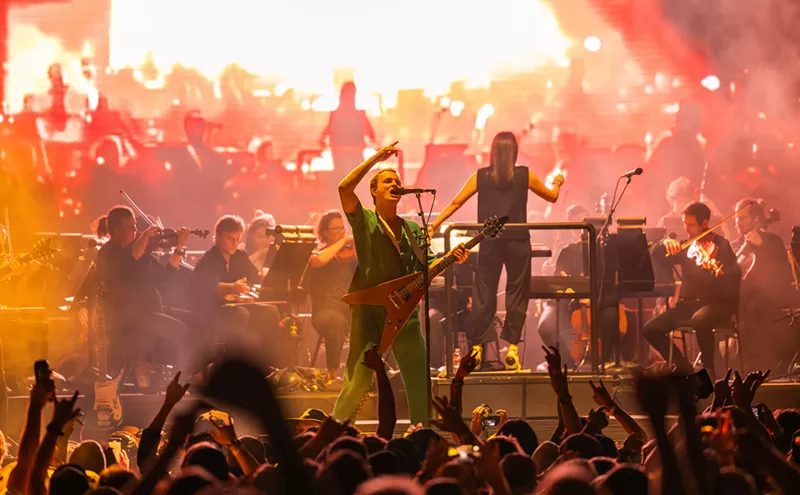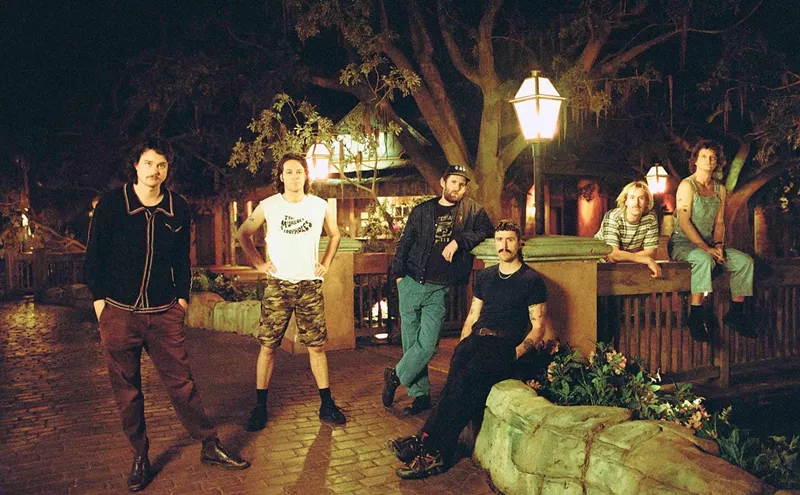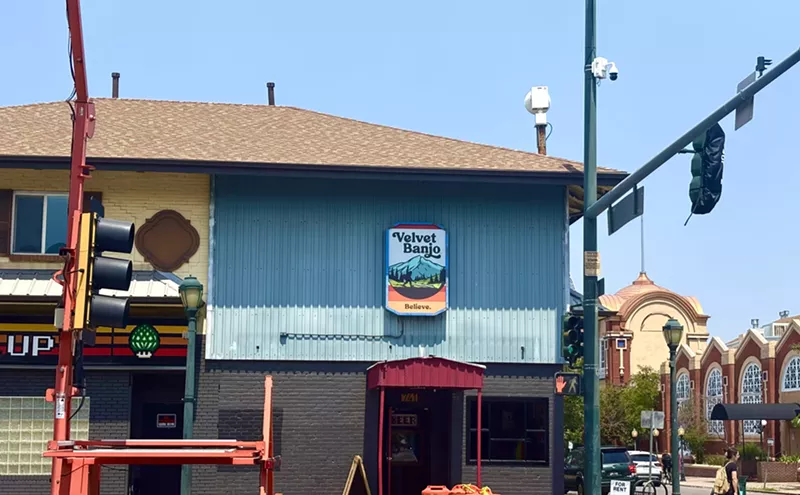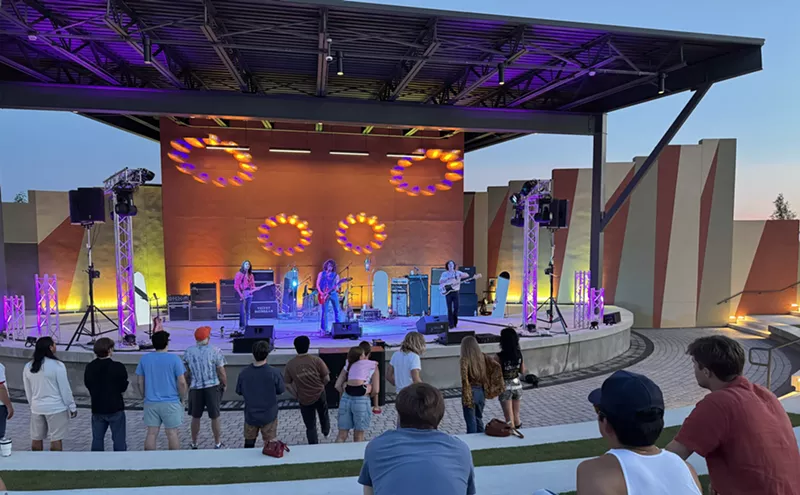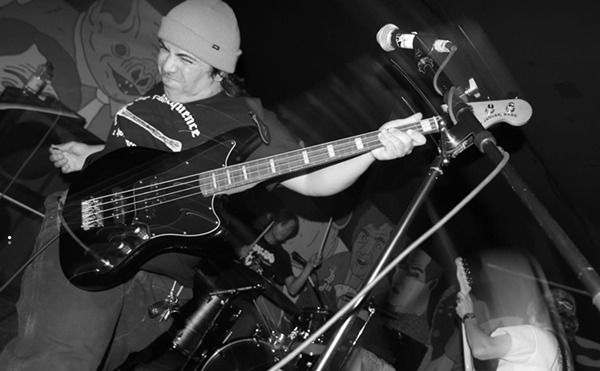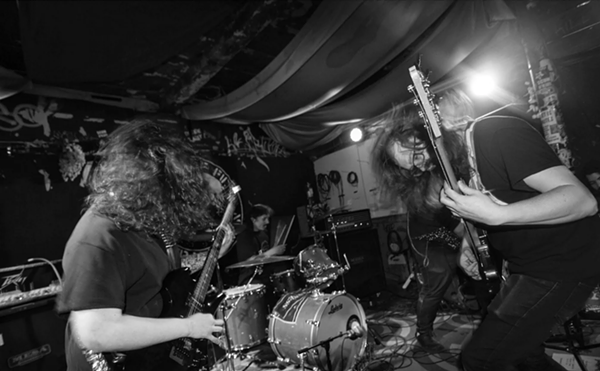The Noid isn't just that pesky pizza-chilling character from old Domino's commercials from the '80s. It's a region of England from which the neo-soul garage-rock band known as the Heavy hails. Fronted by the charismatic Kelvin Swaby, the band came together in its current form as a quartet when Swaby and his friend Dan Taylor finally lined up a rhythm section that didn't just adequately back up their energized music. A quick listen to the band will draw immediate comparisons to Curtis Mayfield, Al Green and James Brown, but with more of a rock-and-roll sound.
In a relatively short period of time, the Heavy has toured the United States and Europe, releasing two records, including the recent The House That Dirty Built. In 2010, the band's song "How You Like Me Now?" was featured in a Kia commercial played during the Super Bowl. For a completely underground band largely producing its own records, the exposure was noteworthy, and most likely resulted because someone at the marketing firm was a fan.
The Heavy also holds the distinction of being one of the few musical acts in the history of the Letterman show to be asked to play a second time. We caught up with Swaby and talked with him about the band's influences and songwriting, Jim Jarmusch and Marmite.
Westword: "Oh No! Not You Again!" has an interesting sample in the beginning. What's it from, and does it relate in any way to the rest of the song?
Kelvin Swaby: The sample is from an old B-movie called Don't Go in the House. It's more related to the album entirely rather than the song specifically. The song is about being haunted, so it relates.
You've been compared to all kinds of things from forty or more years ago, but I was wondering if maybe you took any inspiration from neo-soul rock bands like the Bell Rays and the Dirtbombs?
They're really cool. That song "Chains of Love" by the Dirtbombs is a great track. It's interesting to see how, around the world, there are people going back and revisiting garage punk like it was a forgotten piece of music. I remember finding a song of theirs fifteen or twenty years ago, and I've never looked back. I always wanted to make music as raw as that, and I think we're partway to achieving that.
We always seem to look back a little further. But the Bell Rays, they're really cool, and we played with them in France. Lisa Kekaula has just an insane voice. But even the likes of Jack White, you can hear how he revisited the Sonics and the Wailers -- just a little more fuzz on the shit.
For "That Kind of Man" and other songs with horns and so forth, do you use samples from other songs, or do you create them yourselves?
We tend to sample ourselves these days. We have a kind of hip-hop chemistry with what we do. Vintage ideology with contemporary resources. So we use tools that are available to us that weren't available to these guys way back, but we try not to be super anal about it. We still love early hip-hop, because there are only a handful of artists that are any good these days, I personally believe.
Do you mean early hip-hop artists like Gil Scott-Heron, Afrika Bambaataa and that sort of thing?
Yeah, like Melle Mel and all of that kind of shit. You know they would rip samples and just that whole loop idea. It's almost like we'll record a song as it should sound and then tend to make it sound like the era we want it to come from, and then we go in and chop it all up just like we would take apart record samples.
Public Enemy would do some stuff like that.
That's exactly the way we go about it. The Bomb Squad were pretty cool. We met Hank Shocklee last year. That's a funny story: We met him at a club called Katz in New York -- famous Polish joint. We were there, and he wanted to meet the band, and he said he wanted to produce us, which is quite funny. But we were so far down the line with recording. He was really cool to meet, and he's Hank Shocklee...I have a lot of records from him. I think he wanted "How Do You Like Me Now?" quite a bit, but we're quite happy with the way it turned out.
How did you and Dan Taylor meet, and what kinds of music brought you together?
We met in the early '90s, when we were both out of college for a few years. We decided we were going to do part-time work for a bit. We both had bands. We met in the Gap, of all places. I was there a few weeks before he started. We hit it off immediately -- kindred spirits. We started showing each other bits and pieces of music. I'd play him some old-school hip-hop and he'd say, "This is amazing!" And he'd play me some Neil Young I hadn't ever heard.
We eventually got around to playing with a tiny sampler, a Yamaha SU-10. We couldn't afford the Akai S-900 or S6000. We would always try to get access to studio time to do work, but it was always more fun with just the two of us just being around at each other's houses toying around, just sampling old Booker T breaks or Bo Diddly breaks. I think those were some of the first breaks we chopped up. We made so many beats out of it.
When we were trying to actually get people into a space to rehearse with us to see if these ideas would work out, it was always far too difficult. People from our town kind of complain about it being kind of our mission. But they're prepared to walk with the living dead, and I don't think myself and Dan were prepared to do that. So he decided we were going to do this shit ourselves, and then we brought Spencer in, because he's a terrific bass player, and we managed to get signed, and Chris came on at that time.
In that Songfacts interview, you said "dirt" represents imperfections that you embrace in a way that was embraced by Marvin Gaye and Bill Withers. Why do you feel those imperfections give your recordings character and soul?
They pulled people off the street, didn't they, like drunks and stuff? Give them more drink and tell them to hang around in the studio. They'd have almost no regard for the fact that this major record was being made. It's an imperfection, but it needed to be there. If you listen to the record, it needs to be there. There's an ambience about it. Just having all these dudes in the room.
About five years ago, I had read about how they had brought those drunks off the street, not necessarily just the musicians tracked up, as I had thought before then. When you listen to those Muddy Waters records, you'll hear someone go, "Whoa!" in the background. As much as it is the band, you had other people in there as well, and it's amazing.
We go with the same sensibility when we record. On all of The House That Dirt Built, there are Dan's cats running all through the house on the whole of that record meowing and stuff. But if the tape's good, the tape's good. You leave it all in there.
It's often been said that your music sounds like something from blaxploitation movies from the 1970s, but to me it's more specific than that, and you have a kind of a more upbeat Curtis Mayfield kind of vibe. Was his music an influence on what you do, and how so?
It's funny, because so many people have said, "Curtis Mayfield." I remember one of our first gigs was in Bristol, and a good friend of ours put us on a gig that will be remembered as one of the most ridiculous gigs in Bristol ever. I remember seeing the poster for the first time and reading, "Curtis Mayfield meets the Jon Spencer Blues Explosion."
It is a compliment, but it's funny, because when I was growing up, my father used to play a lot of Hi Records stuff like Al Green, Ann Peebles and Syl Johnson. I was listening to them. I was aware of and loved Curtis and all that sort of thing -- "Freddy's Dead" and "We The People Who Are Darker Than Blue." I didn't really listen to it that much, to be quite honest.
How long were you around before your music started being released by a record label and was there a viable DIY route in England as there is in the States when you first started out or even today?
When we started, we'd literally go out and crash open-mike nights. We'd show up with a Telecaster and an acoustic and our sampler. Before you knew it, people were coming down just to see us because we were doing crazy shit like sampling old Doors records and doing hour-length songs that were our own. We'd never do covers. There is a big open-mike scene in England even now. When we were coming through, after we realized crowds were getting bigger, we thought, "We're going to need a drummer and a bassist."
We went through so many drummers because there are so many that can't just play the song. They had to play a fill there. There doesn't have to be a four-bar fill on a ballad in the middle of a verse. We were always looking for someone more like Al Jackson.
I think the DIY thing, for us, is that we did it ourselves. The first record was done completely ourselves. The second record, we did 85 percent of it in our houses. I don't think you need to go to a studio unless you need to make some serious noise. We record well with tiny little boxes, small amps -- battery-powered things, six inches or something. They're really cool. We'll get it, take it and push it through some stuff. Then when we go to a bigger studio, we'll push it through another amp. I love the recording process.
What was it about Jim Jarmusch's films that served as a place of common ground for you?
Dan loves Mystery Train. It was Down by Law for me, because it's just ridiculous. All of Jim Jarmusch's films are just fantastic. He just seems to be an amazing character as a director. I've read a number of articles about him, and he seems to be such an interesting man.
The plots of his films are these incredible meters, comical meters. Sometimes you just shouldn't be laughing, but you end up laughing at them anyway. I think that's where we bonded. We laugh at the darkness. If we could ever get him to do a video, it would be incredible. We met Tom Waits earlier this year, and he really liked us.
What do you like most about touring the United States, and what do you miss most about England while you're here?
I love the fact that your musical history is fucking incredible. It's our first time down south, and I've just been record shopping, music shopping, finding music I didn't know existed. It's really been an eye-opener. Especially this jaunt. That's what I love about your country: The musical history is incredible, and I discover more and more each time I come here.
The things I miss most are my children -- dearly. We've all been working hard this year, and it's been a great year. And Marmite. You know what it is -- it's a spread. You have Vegemite, but it's not the same thing. We've been looking in every Whole Foods. Generally we buy ourselves a jar, but last time Spencer made the grave error of leaving it in his hand luggage, so he had to give away a jar that would have lasted us the whole tour.



